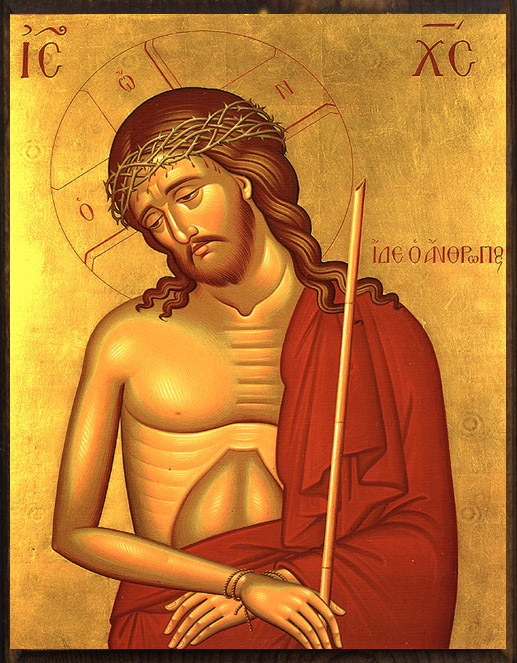The following is excerpted from A Paschal Pilgrimage: A Guide to the Great Fast by Bishop Basil Losten.
‘The Bridegroom Cometh’
On Palm Sunday evening at Vespers we “pass from the feast of palms and branches… to the saving solemnity of the sufferings of Christ.” On Monday, Tuesday, and Wednesday morning of Holy Week, Matins is popularly called the “Bridegroom Service,” because each time we sing the Troparion, “Behold, the Bridegroom is coming in the middle of the night!” (Hear this troparion on Youtube) Each day the Gospel is read. There is Liturgy of Presanctified Gifts on Monday, Tuesday and Wednesday; at this Liturgy the Gospel is also read, although there is no Epistle.
From Great Monday through Holy Saturday we read the books of Exodus and Job at Vespers. Exodus brings us directly into the narrative of the Crossing of the Red Sea, the first Passover, which prefigures the Passover of Christ: His death and Resurrection. Job teaches us that God’s saving grace is a mystery of love. We do not always understand what God does or why God does it; we must trust in God and not pridefully think that we know better than God knows.
The first three days have an eschatological emphasis. They remind us that Holy Week and Pascha are not simply an annual religious celebration, a “time out” from our usual routine; Pascha is the reference point, the moment that fills our whole life with meaning, if our life is to have any meaning. We Christians, who experience the Resurrection, are in this world to announce and proclaim the Kingdom of God throughout our lives.
Holy and Great Monday
On Holy and Great Monday, at Matins we hear the Gospel which recounts the lack of faith of the leaders, and the faith of the sinners. The lesson ends with the warning: “the kingdom of God will be taken from you and given to a nation bearing the fruits of it.” We must not be complacent, but always alert to witness to God’s Kingdom.
At the Liturgy of the Presanctified Gifts, we hear the Gospel lesson in which Jesus announces the end of the world. We Christians should live in this awareness, that this world is passing, that our true homeland, our true citizenship, is not here but in the Kingdom of Heaven.
Holy and Great Tuesday
Today at Matins, we hear the Gospel in which Jesus delivers a ringing, frightening denunciation of religious hypocrisy. We, who have the richest liturgical tradition in Christendom, should listen to this Gospel lesson attentively. Our wonderful, magnificent worship which we love will do us no good at all if we let it become an excuse for spiritual pride, for snobbery, for pretense, for avoiding our duty of justice, mercy, and good faith. Jesus does not teach us to neglect our liturgical worship, but He definitely teaches us to fulfill the Gospel law of service to others, as we saw on Meat-Fare Sunday, which is also called the Sunday of the Last Judgment. May God deliver us from permitting Holy Week to lead us into spiritual complacency.
At the Liturgy of Presanctified Gifts, this theme continues in the Gospel, with the importance of staying awake and being ready for the coming of the Lord. We hear the story of the ten virgins, five wise and five foolish who were waiting for the coming of the Bridegroom; when he actually arrived at midnight, the foolish virgins did not have enough oil for their lamps, and were shut out of the wedding feast. This parable is remembered on each of these days in the Troparion “Behold, the Bridegroom comes at midnight, and blessed is the servant whom He finds watching!” Today the Gospel continues, and we hear the same passage we heard at Sunday of the Last Judgment (Meat-Fare Sunday), emphasizing the importance of the works of mercy.
On Tuesday, a verse is sung both at Matins and at the Presanctified Liturgy which perhaps deserves our attention:
“Come, you faithful, let us serve the Master eagerly, for He gives riches to His servants. Each of us, according to the measure that we have received, let us increase the talent of grace. Let one gain wisdom through good deeds; let another celebrate the Liturgy with beauty; let another share the faith by preaching to the uninstructed; let another give his wealth to the poor. So shall we increase what is entrusted to us, and as faithful stewards of His grace we shall be counted worthy of the Master’s joy.”
This verse emphasizes that no individual can do everything. In the Church, there are a variety of services. But no one is entitled to think himself better than someone else. Instead, we should take joy in giving honour to each other, and appreciating the work that others do.
Great and Holy Wednesday
Today at Matins we hear the Gospel warning of the dangers of rejecting Christ, that we should not be like those who “loved the praise of men more than the praise of God.” We should he moved, yet again, not to take the grace of God for granted in our lives. Since we have known the Gospel, since we do know Christ, since we belong to the Church, our responsibility is that much greater. At Vespers and the Presanctified Liturgy we hear the Gospel about the woman who came to the house of Simon the leper in Bethany and anointed the head of Jesus with expensive, fragrant oil. The liturgical poetry combines this with the account of similar event in Luke, and another in John.
Source: Royaldoors.net




Recent Comments